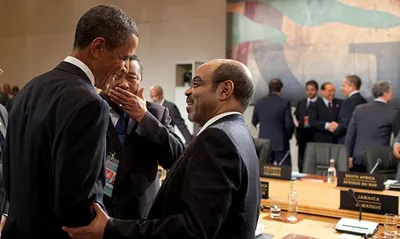On Wednesday, the same day the White House announced a strategic plan committing the United States to elevating its efforts in “challenging leaders whose actions threaten the credibility of democratic processes” in sub-Saharan Africa, a senior member of the U.S. Congress challenged the erosion of press freedom in a key U.S. strategic partner in the Horn of Africa: Ethiopia.
Underscoring the importance of Ethiopia as an important partner for the United States in containing terrorism and ending poverty and famine in the region, Senator Patrick Leahy, a democrat from Vermont, published on Thursday a statement in The Congressional Record, the official daily journal of U.S. Congress, in which he condemned the assault on the freedom of the Ethiopian press under Prime Minister Meles Zenawi. The senator argued that success for the Obama administration’s new partnership with Meles on food security depends on “broad national consultation, transparency, and accountability,” values, he said, that “depend in no small part on a free press.”
Leahy highlighted the emblematic case of Ethiopia’s most prominent imprisoned journalist and blogger, Eskinder Nega. Eskinder, whom PEN American Center honored this year with the Freedom to Write Award, could be convicted on June 21 on vague terrorism charges that carry a life sentence “simply for refusing to remain silent about the Ethiopian government’s increasingly authoritarian drift.” Five days prior to his arrest in September 2011, Eskinder had published an article criticizing the Meles administration “for misusing a vaguely-worded 2009 antiterrorism law to jail journalists and political opponents,” Leahy said.
In public statements and state media, Ethiopian government officials have sought to discredit Eskinder and the other 10 journalists, calling them terrorist accomplices involved in anti-state activities.
The evidence offered against the journalist in court, Leahy said, included “a video of a town hall meeting in which Eskinder discusses the Arab Spring and speculates on whether similar protests were possible in Ethiopia.” The journalist also consistently highlighted “the government’s denial of human rights, and call[ed] for an end to political repression and corruption” despite being jailed seven times, his wife imprisoned, and his newspapers repeatedly banned over two decades, Leahy said.
Leahy was the third member of Congress, after Alaska Senator Mark Begich and California Representative Edward Royce, to publicly voice concern over the persecution of 11 Ethiopian journalists “for questioning government actions and policies–activities that you and I and people around the world would recognize as fundamental to any free press,” he wrote. He added, “Ironically, by trying to silence those who do not toe the official line, the government is only helping to underscore the concerns that many inside and outside of Ethiopia share about the deterioration of democracy and human rights in that country.”
In the statement, Leahy, the chairman of a sub-committee responsible for funding portions of U.S. assistance to foreign countries, said the “importance of respecting freedom of the press cannot be overstated” in the disbursement of aid to the government.
